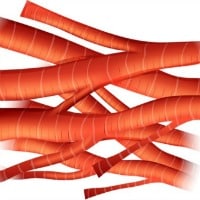Heart cells stop dividing shortly after birth, and very little renewal occurs in adulthood. Therefore, if heart cells are damaged, e.g. by a heart attack, there is little than can be done to help repair and restore the heart. However, research conducted by Professor Eldad Tzahor of the Weizmann Institute of Science’s Biological Regulation Department, suggests that a protein called ERBB2 may hold the key to regenerating heart cells. ERBB2 is a specialized receptor that works together with a second receptor by binding a growth factor called neuregulin 1 (NRG1). Professor Tzahor’s team conducted a study on mice to determine ERBB2’s role in hear cell regeneration. Newborn mice are able to regenerate damaged cardiomyocytes (heart muscle cells) however this ability is lost by the time they are just 7-days-old. Study results showed that cardiomyocytes of mice treated with NRG1 continued to proliferate on the day of birth; but the effect dropped dramatically within a week, even with ample amounts of NRG1. Further investigations revealed that cell proliferation dropped in line with declining levels of ERBB2 on the cardiomyocyte membranes. A number of further studies revealed that that too little or too much of ERBB2 had a deleterious impact on heart function. The researchers then set out to determine what would happen if it was possible to activate ERBB2 for a short period in an adult heart following a heart attack. Might it be possible to trigger cardiomyocyte renewal, without any of the deleterious effects seen with too much or too little ERBB2? Results showed that it is indeed possible to activate ERBB2 in mice for a short interval following an induced heart attack. What’s more, the short-term activation of ERBB2 led to an almost complete regeneration of the heart within several weeks. “The results were amazing,” said Professor Tzahor. “As opposed to extensive scarring in the control hearts, the ERBB2-expressing hearts had completely returned to their previous state.” Professor Tzahor and his team are planning further studies of the ERBB2 signaling pathway.
Growth Factor Regenerates Heart Cells in Mice
D'Uva G, Aharonov A, Lauriola M, Kain D, Yahalom-Ronen Y, Carvalho S, et al. ERBB2 triggers mammalian heart regeneration by promoting cardiomyocyte dedifferentiation and proliferation. Nat Cell Biol. 2015 Apr 6.[Epub ahead of print]
RELATED ARTICLES




